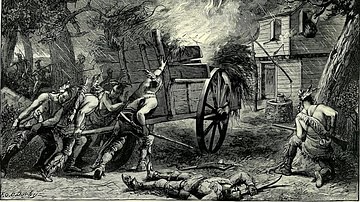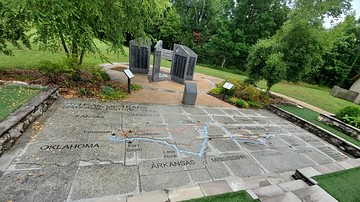Search
Did you mean: Indra?
Search Results

Definition
Captain Kidd
Captain William Kidd (c. 1645-1701) was a Scottish privateer turned pirate who, despite only ever capturing one significant prize ship, has become legendary thanks to the persistent rumour he buried a fantastic treasure that nobody has yet...

Definition
Periplus of the Erythraean Sea
The Periplus of the Erythraean Sea is an eyewitness account of ancient travel to Africa and India via the Red Sea written by an unknown Greek-speaking Egyptian author in the 1st century CE. In this detailed account, the conditions of the...

Definition
Little Crow (Eastman's Biography)
Little Crow (Taoyateduta, also known as Little Crow III, l. c. 1810-1863) was a Dakota Sioux chief best known as the leader of the Mdewakanton Dakota (Santee) Sioux during the Dakota War of 1862. After years of trying to maintain peaceful...

Definition
Tamahay (Eastman's Biography)
Tamahay (Tahama, Tamaha, "Pike", l. c. 1776-1864) was a Mdewakanton Dakota Sioux guide and scout who sided with the Americans against the British during the War of 1812. He was a famous advocate of the American cause and a close friend of...

Definition
Sir William Johnson
Sir William Johnson, 1st Baronet (l. c.1715-1774) was a British military officer, diplomat, and Superintendent of Indian Affairs. He was instrumental in aligning the Native Americans of New York with the British during the French and Indian...

Article
Trade Goods of the East India Company
The English East India Company (EIC) was founded in 1600, and it came to control both trade and territories in India, as well as a trade monopoly with China. Goods the EIC traded included spices, cotton cloth, tea, and opium, all in such...

Article
The Early History of Clove, Nutmeg, & Mace
The spices clove, nutmeg, and mace originated on only a handful of tiny islands in the Indonesian archipelago but came to have a dramatic, far-reaching impact on world trade. In antiquity, they became popular in the medicines of India and...

Article
Timeline & Battles of King Philip's War
King Philip's War (1675-1678) was the pivotal engagement between the second generation of English immigrants who had arrived in New England and the Native American tribes of the region. The English won the war, and the natives lost not only...

Article
A Soldier Recalls the Trail of Tears: John G. Burnett Account - A Primary Source Hoax
The Trail of Tears was a series of forced relocations of the "Five Civilized Tribes" – the Choctaw, Seminole, Muscogee Creek, Chickasaw, and Cherokee – between 1831 and 1850, from their ancestral homes in the Southeast USA to "Indian Territory"...

Article
Yellow Hair: George Armstrong Custer
Yellow Hair: George Armstrong Custer is the Cheyenne and Arapaho account of Lt. Colonel George Armstrong Custer (l. 1839-1876), his interaction with the Southern Cheyenne Chief Black Kettle (l. c. 1803-1868), the Washita Massacre (27 November...